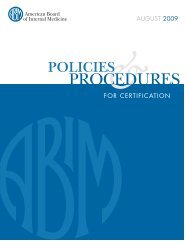The SRA Symposium - College of Medicine
The SRA Symposium - College of Medicine
The SRA Symposium - College of Medicine
You also want an ePaper? Increase the reach of your titles
YUMPU automatically turns print PDFs into web optimized ePapers that Google loves.
Papers<br />
various ethics rules dependent upon the employee’s status and other circumstances. (70 FR 168<br />
(2005), at 51562.)<br />
HHS revised the rules at 5 C.F.R. §5501.109 “to accommodate a significant number <strong>of</strong> comments<br />
from pr<strong>of</strong>essional associations, constituent groups, university observers, employees and their<br />
families regarding the new restriction on employment, including<br />
consultation and board service, with ‘related trade, pr<strong>of</strong>essional or similar associations.’”<br />
<strong>The</strong> Department reported that “the comments expressed concern that restrictions imposed on<br />
the ability <strong>of</strong> NIH employees to participate fully as members <strong>of</strong> the greater scientific community<br />
would negatively affect the public health because NIH scientists<br />
would become isolated from their counterparts in the private and academic sectors * * *[.]”<br />
HHS acknowledged that “a reduction in recruitment and retention at NIH would result, and returned<br />
to the reference to the National Academy <strong>of</strong> Sciences commentary (NAP 1994). (70 FR 168<br />
(2005), at 51562 -51563.)<br />
<strong>The</strong> regulations at 5 C.F.R. §5501.109(c)(3)(iii)—setting an exception to the outside activity prohibition<br />
for clerical or similar services—was amended to correspond with the changes to the FDA<br />
counterpart at 5 C.F.R. §5501.106(c)(3)(ii)(B). And the final rule identifies four additional activities<br />
exceptions:<br />
• 5 C.F.R. §5501.109(c)(3)(i)(B) permits compensation for a single class.<br />
• A new 5 C.F.R. §5501.109(c)(3)(vii) permits an compensation exception not only continuing<br />
pr<strong>of</strong>essional education but for Grand rounds.<br />
• For service on Data Safety Monitoring Boards (DSMBs). And<br />
• For service on grant and scientific review committees for private foundations and other grantmaking<br />
entities. (70 FR 168 (2005), at 51563 -51564.)<br />
<strong>The</strong> regulations at 5 C.F.R. §5501.109 addressing prohibited financial interests applicable to<br />
NIH employees was amended to define “senior employee” to include:<br />
• the NIH Director and the NIH Deputy Director;<br />
• members <strong>of</strong> the senior staff within the Office <strong>of</strong> the Director who report directly to the NIH<br />
Director;<br />
• the Directors, the Deputy Directors, Scientific Directors, and Clinical Directors <strong>of</strong> each NIH<br />
institute and center (IC);<br />
• extramural program <strong>of</strong>ficials who report directly to an IC Director; and<br />
• any employee <strong>of</strong> equivalent levels <strong>of</strong> decision-making responsibility who is designated as a<br />
senior employee by the designated agency ethics <strong>of</strong>ficial or the NIH Director, in consultation<br />
with the designated agency ethics <strong>of</strong>ficial.<br />
Moreover, the rules continue to bar senior employees, their spouses, and minor children from<br />
holding financial interests in substantially affected organizations, subject to the exceptions for pensions<br />
and other employee benefits, diversified mutual funds, and the “exceptional circumstances”<br />
that existed under the interim final rule. (70 FR 168 (2005), at 51564 -51566.)<br />
<strong>The</strong> regulations at 5 C.F.R. §5501.111 were amended to set a uniform rule for employees governed<br />
by whether the award donor has matters pending under the employee’s <strong>of</strong>ficial responsibility. <strong>The</strong><br />
definition <strong>of</strong> “<strong>of</strong>ficial responsibility” is that in 18 U.S.C. §202(b), to wit: “the direct administrative<br />
or operating authority, whether intermediate or final, and either exercisable alone or with others,<br />
and either personally or through subordinates, to approve, disapprove, or otherwise direct Government<br />
action.” (70 FR 168 (2005), at 51566 -51567.)<br />
2005 <strong>Symposium</strong> Proceedings Book 85

















